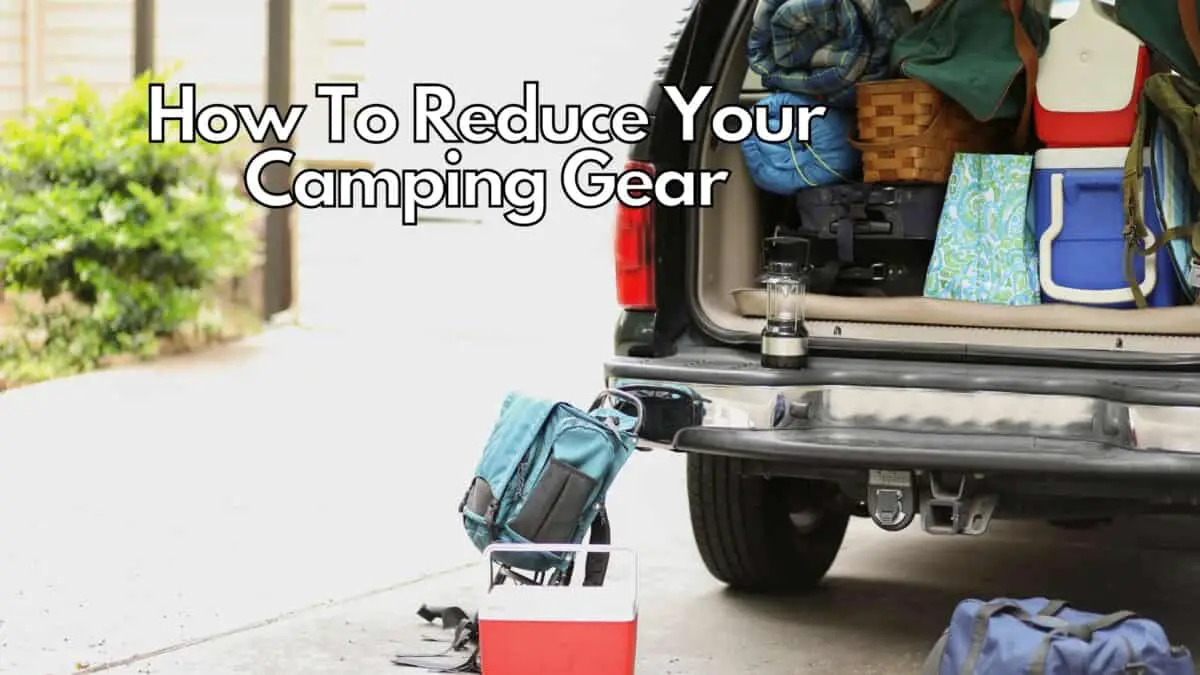Packing is an important part of any trip. Whether you’re going on a cross-country road trip or camping in the mountains, it is important that you pack everything that you will be needing. There is a fine line between packing too little and packing too much, and more often than not, finding the sweet spot in between is quite challenging.
Everyone who has gone camping knows the feeling of packing their camping gear over and over again—weighing the decisions between luxury and necessity, comfort, or lightweight packing. We can help you bring everything you need while not sacrificing anything in between.
How do you reduce your camping gear, and save space when packing?
First, you need to evaluate the items that you need to bring. Second, you have to save space in your trunk by choosing products that have multiple purposes. Lastly, we’ll give you storing ideas that can help you bring all the items to your camping trip.
In all our years of backpacking and camping, we have mastered the practice of only bringing the items that we need on serious camping trips, or taking everything that we want to bring in party trips. In this article, we’ll teach you how to properly evaluate all your gears, and planning how to pack them.
Car camping is an easy and convenient alternative to regular camping, especially if you’re a first time camper who’s still testing the waters. There are a few things that you have to keep in mind like “Can you sleep anywhere in a camper van?” before you begin your journey.
How to evaluate your camping gears
If your primary concern is reducing the weight of the camping gear that you want to bring, the first thing you need to do is to evaluate the items between necessity or luxury. By doing so, we don’t only minimize the weight of your pack, but also the space in your car.
So, how do you differentiate essential items from luxury ones? Here’s a quick rundown.
Essential Items: Things you can’t leave without
- Food – prepped meals, and water storage or water filters
- Shelter – tent and sleeping pads
- Tools – hatchet, knife, cooking, and eating utensils
- Fire – stove, matches, or lighter
- Security – mobile phones, and first aid kit
Essential items generally mean the everyday items that you can’t leave without. This is also true for camping.
Luxury Items: Things that bring beauty and comfort
Let’s all be honest. If given the chance, even when camping, we would always choose comfort over everything else. But if you want to bring a lighter load on your hiking or tracking trips, it’s important that you separate the luxury items that you don’t actually need from the essential ones.
Not sure what these items are? Here are some examples:
- Hygiene – portable toilet and camp showers. Though not available in all parks, you can ask your camping park if there are available common showers and toilet areas.
- Ambiance – rugs and rope lights. If you’re not planning to have some glamping, you can let go of the items that you don’t need. Instead of rope lights, you can choose to bring a portable lantern or headlamps, which are more convenient.
- Comfort – extra mattresses and pillows. When you’re camping out during summer, you can let go of the extra mattresses, which are heavy and take up a lot of space.
- Tools – pop up canopy, collapsible table, and complete portable camp kitchen. Just like shower areas, parks have common areas, where you can prepare your food and eat. On your next trip, ask your ideal camp park if they can accommodate your amount of campers in terms of kitchen and dining area.
- Gadgets – coffee machine, laptop, and free-standing hammock. If you can’t live without a cup of coffee, there are portable options that are lightweight and have great brewing taste.
Hacks to save space in your trunk: downsize!
After evaluating your camping gear, the next thing to do is determine how you can downsize the items that you’re going to bring. Of course, reducing doesn’t mean not actually bringing the items that you need. Rather, it’s how you can bring and pack them in the most efficient way.
-
Pack in small sizes
Imagine having to bring loads of boxes and bottles for a short camping trip. All your shampoos and liquid soaps can be transferred into small travel bottles to further minimize your space. Your regular kitchen utensils can be also replaced with camping utensils that are more compact and travel-friendly.
-
Look for multi-purpose gears
Downsizing doesn’t always necessarily mean having less. Sometimes, it may also mean upgrading to items that have multiple purposes. Here are some examples:
-
- Your regular kitchen equipment to compact kitchen intended for camping.
- Do you have a hatchet to chop woods for your campfire? Well, there are hatchets on the market today that can also be used as hammers to drive stakes on your tent.
- Storage bins for prep table and washbasin? One of the many things that we discovered when we were trying to limit the items that we wanted to bring is how to use the items that we already have and experiment with them. You can use the top cover of your storage bin as a prepping table for your meal, for example. After dinner, the storage bin itself can be used as a washbasin for your dishes.
- Compression sacks as pillows. After removing your sleeping pads from the compressions sacks, you can fill them up with air, cover with a t-shirt, and use them as a pillow.
-
Plan and prep your menu ahead of time
To avoid any waste and carrying bulky ingredients with you, it’s best to plan and prep your menu before leaving the house. In our case, we usually cut the veggies and meat, separate them in proportions, and individually package them inside our cooler.Additionally, create meals that have common ingredients. This way, you only have to prepare minimal containers when separating your ingredients. If there are any leftovers, think of a way to reheat or repurpose these for your next meal.
After preparing all your ingredients, make sure to map out your cooler to ensure that you chill everything accordingly. Coolers can take up a lot of space in your trunk, meaning that you have to store as many things as possible inside it.
-
Pack military-style
We understand that you need to bring lots of clothes. Efficient packing actually means taking the clothes that you need, and packing them as nicely and efficiently as possible. After multiple trials and errors, we found out that the military-style of folding is the best way to do it.It’s fairly easy to do. Just fold your clothes in half, roll them tightly, and lock them within the clothing.
You can check out this video to learn more:
-
Choose the right tent
One of the most important equipment that you need when camping is a tent. Before going camping, think about how many people will sleep inside the tent, as tents can differ in shapes, sizes, weight, and designs.If you’re looking for tent suggestions, check out our article on the best tents for camping where we listed and reviewed the top tents available in the market today.
-
Save those extra beddings
If you’re travelling with your family, it might be a good idea to share your beddings. An experienced camper shared her story with us, to illustrate that point. When her family goes camping, they typically carry only two air mattresses. Since there are four of them, they would connect the two beds together and snuggle up.
Final Thoughts
Packing for a camping trip can be the most stressful part of your outing, but there is a way for you to avoid all this stress. All you need to do is evaluate all the items that you want to bring, then downsize them to items that you will be needing. After that, all you have to do is pack these items efficiently and you’re good to go.
The kind of packing that you need to do is dependent on the kind of camping that you will be doing. If you’re going car camping, packing won’t be that difficult because your vehicle will allow you to bring things that are more bulky. But when it comes to a backpacking trip where you’ll need to hike to your destination, packing light is the way to go.
No matter what kind of camping you’ll be doing, it is always better to only pack the necessary items that you will be needing for your trip. If you have a bit of a problem with over packing, follow our tips the next time you’re preparing for a trip to make sure that you will only bring the essentials.

